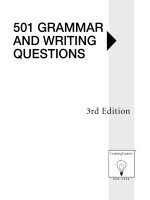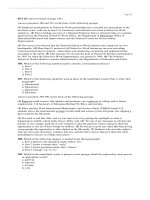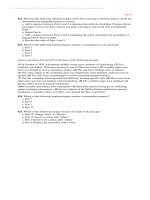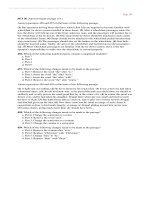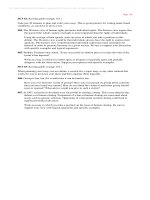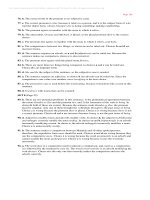501 GRAMMAR AND WRITING QUESTIONS 3rd Edition PHẦN 2 potx
Bạn đang xem bản rút gọn của tài liệu. Xem và tải ngay bản đầy đủ của tài liệu tại đây (117.38 KB, 16 trang )
16. “I remember” Luis recollected, “the first time I
was allowed to walk home from school by
myself.”
a. ?
b. ,
c. :
d. ;
e. none
17. Madeline Larkin our office manager, is the
most organized person I’ve ever known.
a. :
b. ;
c. –
d. ,
e. none
18. I spend most of my time at the gym on the
treadmill walking is my favorite form of
exercise.
a. ,
b. ?
c. ;
d. !
e. none
SET 3 (Answers begin on page 104.)
Choose the answer that shows the best punctuation
for the underlined part of the sentence. If the sentence
is correct as is, choose e.
19. Simone bought three new pairs of shoes even
though she had put herself on a tight budget
just last week.
a. shoes, even though, she
b. shoes, even though she
c. shoes. Even though she
d. shoes; even though she
e. correct as is
20. Most residents of the building have air
conditioners however I’ve always found that a
ceiling fan is sufficient.
a. air conditioners however: I’ve
b. air conditioners, however, I’ve
c. air conditioners however, I’ve
d. air conditioners; however, I’ve
e. correct as is
21. “Are you OK,
” aske
d Timothy, “Ar
e you sure
you don’t want to sit down and rest for a
while?”
a. OK?” asked Timothy. “Are
b. OK?” asked Timothy, “Are
c. OK,” asked Timothy? “Are
d. OK?” asked Timothy? “Are
e. correct as is
22. The owners of the restaurant maintain that
only organic ingredients are used in their
kitchen.
a. maintain, that only
b. maintain that, only
c. maintain: that only
d. maintain—that only
e. correct as is
23. Before the student could be hired by the
c
ompany, the students adviser had to provide a
letter of recommendation.
a. company the students
b. company, the student’s
c. company, the students’
d. company the students’
e. correct as is
––MECHANICS: CAPITALIZATION AND PUNCTUATION––
5
24. The volunteers who would like to work the
morning shift
should sign their name on this
sheet.
a. volunteers, who would like to work the
morning shift
b. volunteers who would like to work the
morning shift,
c. volunteers, who would like to work the
morning shift,
d. volunteers who, would like to work the
morning shift,
e. correct as is
25. The employees asked whether the company
would be offering tuition r
eimbursement
within the next three years?
a. reimbursement within the next three years!
b. reimbursement, within the next three years.
c. reimbursement within the next three years.
d. reimbursement, within the next three years?
e. correct as is
26. This is the new restaurant you’ve been talking
ab
out, isn’t it?
a. about isn’t it?
b. about, is’nt it?
c. about, isn’t it.
d. about isn’t it.
e. correct as is
27. T
urnips a root vegetable can be mashed,
roasted, or used in casseroles.
a. Turnips, a root vegetable,
b. Turnips, a root vegetable
c. Turnips, a root vegetable—
d. Turnips a root vegetable,
e. correct as is
28. They met for the first time on A
ugust 27, 1972
in Seattle, Washington.
a. August 27 1972 in Seattle, Washington.
b. August 27 1972, in Seattle Washington.
c. August 27, 1972 in Seattle, Washington.
d. August 27, 1972, in Seattle, Washington.
e. correct as is
SET 4 (Answers begin on page 104.)
For each question, find the sentence that has a mis-
take in capitalization or punctuation. If you find no
mistakes, mark choice d.
29. a. My least favorite season is Winter.
b. Next Friday, Uncle Jake is coming to visit.
c. Maureen served as treasurer for the
women’s organization.
d. No mistakes.
30. a. “Can you attend next week’s meeting?” she
asked.
b. His new car was damaged in the accident.
c. The girls’ giggled through the whole movie.
d. No mistakes.
31. a. Leo told her, to call the customer service
department in the morning.
b. She put up signs all over town, but she
didn’t get any response.
c. Occasionally, her neighbors ask her to feed
their cat.
d. No mistakes.
32. a. Did you see the movie Shrek?
b. She was given an award by mayor Chambers.
c. Math and science are my two best subjects.
d. No mistakes.
––MECHANICS: CAPITALIZATION AND PUNCTUATION––
6
33. a. A major highway is being built on the
outskirts of town.
b. When you reach the traffic light on
Berkshire Road, turn right onto Springfield
Blvd.
c. We were staying at my sister’s cape Cod
vacation home.
d. No mistakes.
34. a. The instructor asked us if we needed more
time?
b. Carla’s mother is a pediatric dentist.
c. Every item in the store costs less than a
dollar.
d. No mistakes.
35. a. Jane’s family owned three Persian cats.
b. My Uncle always takes the subway to Yankee
Stadium.
c. Everyone knows that Marisa’s favorite book
is Pride and Prejudice.
d. No mistakes
36. a. “I’ll do the grocery shopping for you,
grandma,” Lucy said.
b. “Where can I find the best pizza in town?”
he asked.
c. “Be sure to arrive two hours early,” she
warned.
d. No mistakes.
37. a. I always have a hard time getting up in the
morning.
b. We took: a tent, a cooler, and a sleeping bag.
c. The fog was as thick as potato soup.
d. No mistakes.
38. a. This is someone elses coat.
b. Which of these songs was recorded by Bruce
Springsteen?
c. That book must be yours.
d. No mistakes.
39. a. Don’t stand in my way.
b. Cecilia and I fought our way through the
crowd.
c. The vegetables were old rubbery and
tasteless.
d. No mistakes.
40. a. Remember to walk the dog.
b. “Don’t run”! Mr. Ellington shouted.
c. It’s supposed to snow today and tomorrow.
d. No mistakes.
41. a. Charleen’s parents worried whenever she
drove the car.
b. Who designed the Brooklyn Bridge?
c. Diseases like Smallpox and Polio have been
eradicated.
d. No mistakes.
42. a. Can you find the Indian ocean on this map?
b.
Which river, the Nile or the Amazon, is
longer?
c. Lerner Avenue runs into the Thompson
Parkway.
d. No mistakes.
43. a. He’s the best dancer in the school.
b. We were planning to go, but the meeting
was canceled.
c. “Okay,” she said, I’ll go with you.”
d. No mistakes.
44. a. Does Judge Parker live on your street?
b. Twenty government officials met to deal
with Wednesday’s crisis.
c. The Mayor spoke at a news conference this
morning.
d. No mistakes.
––MECHANICS: CAPITALIZATION AND PUNCTUATION––
7
45. a. My brother, Isaac, is the best player on the
team.
b. Because of the high cost; we decided not to go.
c. Where’s your new puppy?
d. No mistakes.
46. a. I have learned to appreciate Mozart’s music.
b. My cousin Veronica is studying to be a
Veterinarian.
c. Mr. Shanahan is taller than Professor
Martin.
d. No mistakes.
47. a. “You look just like your mother,” Ms. Jones
told me.
b. “Please be careful,” he said.
c. Tyler asked, “why do I have to go to bed so
early?”
d. No mistakes.
48. a. Do you prefer root beer or orange soda?
b. In which year did world war II end?
c. I like to study the geography of the
Everglades.
d. No mistakes.
49. a. Colds like many other viruses are highly
contagious.
b. Call me when you feel better.
c. Did you wash your hands, Michael?
d. No mistakes.
50. a. The industrial revolution began in Europe.
b. Is Labor Day a national holiday?
c. General Patton was a four-star general.
d. No mistakes.
51. a. Carmen brought bread, and butter, and
strawberry jam.
b. Let’s look at the map.
c. Be sure to thank Aunt Helen for the gift.
d. No mistakes.
52. a. My Aunt Georgia loves to read Eighteenth-
Century novels.
b. Eli’s sister’s cousin lives in Alaska.
c. Is that a German shepherd?
d. No mistakes.
53. a.Those shoes are too expensive.
b. Michael’s best friend is Patrick.
c. Did you hear that Inez got a new puppy.
d. No mistakes.
SET 5 (Answers begin on page 105.)
Questions 54–57 are based on the following passage.
First, read the passage, and then choose the answer
that shows the best capitalization and punctuation
for each underlined part.
Madam Helena P. (54) B
lavatsky born in
Russia on May 8, 1831, claimed to have psy-
chic powers and to be capable of performing
feats of clairvoyance and telepathy. During
her sixty years, she traveled to many (55)
c
ountries—inc
luding the United States,
England, India, and Egypt, in order to study
the occult. Although many considered her a
(56) fak
e throug
hout her lifetime she was
surrounded by faithful believers, including
such influential persons as British states-
man Allen O. Hume and Swedish countess
Constance Wachtmeister. To this day, fol-
lowers commemorate the date of her (57)
d
eath calling May 8, “White Lotus Day.”
54. a. Blavatsky: born
b. Blavatsky—born
c. Blavatsky, born
d. Blavatsky. Born
e. correct as it is
––MECHANICS: CAPITALIZATION AND PUNCTUATION––
8
55. a. countries, including
b. countries: including
c. countries. Including
d. countries including
e. correct as it is
56. a. fake, throughout
b. fake. Throughout
c. fake: throughout
d. fake; throughout
e. correct as it is
57. a. death. Calling
b. death, calling
c. death: calling
d. death; calling
e. correct as it is
Questions 58–61 are based on the following passage.
First, read the passage, and then choose the answer
that shows the best capitalization and punctuation
for each underlined part.
June 2, 2006
Melanie Jeffords
312 Maple Avenue
Chicago, Illinois 60632
Mark (58) F
ranklin, general manager
Wholesome Food Market
1245 Main Street
Chicago, Illinois 60627
(59) d
ear Mr. Franklin;
I am writing to complain about the behav-
ior of one of your sales clerks. On (60) M
on-
day May 22nd I visited your store to return
a package of ground turkey that I had pur-
chased the day before. When I explained to
your sales clerk that the expiration date on
the package was May 1st, she was (61)
e
xtr
emely rud
e and she refused to refund
my money. This is not the kind of treatment
I expect from your fine establishment. I hope
you will make restitution and have a discus-
sion with your staff about customer service.
My receipt is enclosed.
Sincerely yours,
Melaine Jeffords
58. a. Franklin, general Manager
b. franklin, General Manager
c. Franklin, General Manager
d. Franklin, General manager
e. correct as it is
59. a. Dear Mr. Franklin.
b. Dear, Mr. franklin,
c. dear Mr. Franklin:
d. Dear Mr. Franklin:
e. correct as it is
60. a. Monday, May 22nd I
b. Monday May 22nd; I
c. Monday. May 22nd I
d. Monday, May 22nd, I
e. correct as it is
61. a. extremely rude, and she
b. extremely rude: and she
c. extremely rude? And she
d. extremely rude and, she
e. correct as it is
––MECHANICS: CAPITALIZATION AND PUNCTUATION––
9
sentence is like a Christmas present: Assembly is always required. Fortunately, the instructions are
fairly basic. Every sentence must have at least a subject and a predicate. The subject is the focus
of the sentence; it is the who or the what the sentence is about. The predicate describes the sub-
ject; it explains what the subject is or what the subject is doing. The completed idea is called a clause, and it is the
building block of all sentences.
First, you have to know these terms:
✓ Independent clause: a clause that expresses a complete thought.➞Monica walked on the grass.
✓ Dependent (subordinate) clause: a clause that does not express a complete thought.➞Though it was wet
✓ A complete thought➞Though it was wet, Monica walked on the grass.
✓ Essential clause: a dependent clause that is necessary to the basic meaning of the completed sentence.
➞who are pregnant
Women who are pregnant can crave salty or sweet foods.
✓ Nonessential clause: a dependent clause that is not necessary to the basic meaning of the completed
sentence.➞who growls whenever the phone rings
Elmo, who growls whenever the phone rings, tried to attack the vacuum cleaner.
✓ Phrase: a group of words that lack either a subject or a predicate.➞In early spring
In early spring, I notice a change in people’s attitudes.
✓ Appositive: a phrase that makes a preceding noun or pronoun clearer or more definite by explaining or
identifying it.➞rice pudding and fruit salad
Candice’s grandfather brought her favorite desserts, rice pudding and fruit salad.
SECTION
Sentence
Structure
2
11
✓ Fragment: a phrase punctuated like a sentence even
though it does not express a complete thought.➞
Timothy saw the car. And ran.
✓ Coordinating Conjunction: a word that when pre-
ceded by a comma or a semicolon joins two inde-
pendent and equal clauses. (and, but, so, or, for, nor,
yet)➞Dorothy had a beautiful rose garden, and her
yard was a profusion of color every summer.
✓ Subordinating Conjunction: a word that makes a
clause a dependent clause (after, although, as,
because, before, if, once, since, than, that, though,
unless, until, when, whenever, where, wherever,
while)➞After the accident, mourners covered the
beaches nearest to the tragedy with roses.
✓ Conjunctive Adverb: a word that introduces a rela-
tionship between two independent clauses (accord-
ingly, besides, consequently, furthermore, hence,
however, instead, moreover, nevertheless, otherwise,
then, therefore, thus)➞On Tuesdays, I play racquet-
ball; otherwise, I would go with you.
To construct a sentence:
✓ Always have at least one independent clause in the
sentence.
✓ Join two independent clauses with a semicolon or
a comma and a conjunction.➞Chaucer was a nar-
rator, and he was a pilgrim in his Canterbury Tales.
✓ Do not run two or more independent clauses
together without punctuation; that error is appro-
priately called a run-on. Wrong: Chaucer was a nar-
rator and he was a pilgrim in his Canterbury Tales.
✓ Do not separate two independent clauses with just
a comma; that error is called a comma splice.
Wrong: Chaucer was a narrator, he was a pilgrim in
his Canterbury Tales.
✓ Do not use a conjunctive adverb (the words accord-
ingly, besides, consequently, furthermore, hence, how-
ever, instead, moreover, nevertheless, otherwise, then,
therefore, thus) like a conjunction. Wrong: Chaucer
was a narrator, moreover he was a pilgrim in his
Canterbury Tales.
✓ Use a comma after a conjunctive adverb when it fol-
lows a semicolon. (See Conjunctive Adverbs)
✓ Use a comma after introductory words, phrases,
and clauses. (See Subordinating Clauses)
✓ Use commas around nonessential clauses. Do not
use commas around essential clauses. (See
Nonessential and Essential Clauses)
✓ Use commas around appositives. (See Appositives)
✓ Use commas around parenthetical elements (a word
or group of words that interrupt a sentence’s
flow).➞Mrs. Moses, that mean old crone, yelled at lit-
tle Paula for laughing too loud!
SET 6 (Answers begin on page 105.)
Fill in the blank with the word that creates the most
logical sentence. (Hint: Use a dictionary to determine
which words best complete the sentence’s meaning.)
62. ________ Sarah drives to the cabin several
times a year, she is often nervous about finding
her way.
a. Besides
b. Unless
c. Nevertheless
d. Although
63. Lila wasn’t feeling well. _____________, she
decided to stay home from work.
a. Therefore
b. Meanwhile
c. However
d. Anyway
64. ___________ he waited for the doctor to call
him in, Sam sat in the waiting room and read
the newspaper.
a. So that
b. While
c. Even if
d. Besides when
– SENTENCE STRUCTURE–
12
65. Ruby loves blueberry pie _________ it is made
with freshly picked blueberries.
a. whether
b. because
c. when
d. as if
66. Mitchell loves listening to jazz and rhythm
and blues. Greg, ____________, will only listen
to country.
a. however
b. then
c. too
d. therefore
67. __________ our low annual fee, you will
receive a 20% discount if you sign up this week.
a. Because
b. While
c. In spite of
d. In addition to
68. The ticket said the show would start at 8:00,
but the curtains didn’t go up _________ 8:30.
a. less than
b. until
c. about
d. since
69. My neighbor is deathly afraid of dogs;
___________, I never let my Golden Retriever,
Sandy, outside without a leash.
a. moreover
b. yet
c. mainly
d. consequently
70. The wedding quilt was designed as a
sentimental way to make use of fabric taken
______________ blankets and bedding that
belonged to older couples in her family.
a. from
b. with
c. in
d. at
71. Sandra Day O’Connor, the first woman to serve
on the U.S. Supreme Court, ________
appointed by President Ronald Reagan in 1981.
a. she
b. and
c. but
d. was
72. I ________ the speech you gave last Thursday
night, but I was in bed with the flu.
a. will have heard
b. would hear
c. might hear
d. would have heard
73. ________ the Beatles’ most popular songs—
most of which were written by Lennon and
McCartney—are “I Want to Hold Your Hand”
and “Hey, Jude.”
a. With
b. Considering
c. Among
d. To
– SENTENCE STRUCTURE–
13
SET 7 (Answers begin on page 106.)
Choose the sentence that best combines the under-
lined sentences.
74. The airp
ort is called the Gl
ynco Jetport.
The
airline rese
rvations and t
ravel systems r
efer to
its locatio
n as Brunswick,
Georgia.
a. Where the airport is called the Glynco
Jetport, the airline reservations and travel
systems refer to the location as Brunswick,
Georgia.
b. But the airport is called the Glynco Jetport,
the airline reservations and travel systems
refer to the location as Brunswick, Georgia.
c. Even though the airline reservations and
travel systems refer to the location as
Brunswick, Georgia, the airport is called the
Glynco Jetport.
d. When the airport is called the Glynco
Jetport, the airline reservations refer to the
location as Brunswick, Georgia, and the
travel systems.
75. Plat
o believed that boys and girls should be
given an equal education. This idea is rarely
mentioned in textbooks.
a. Plato believed that boys and girls should be
given an equal education, where this idea is
rarely mentioned in textbooks.
b. Plato believed that boys and girls should be
given an equal education, an idea that is
rarely mentioned in textbooks.
c. Believing that boys and girls should be given
an equal education, Plato’s idea is rarely
mentioned in textbooks.
d. Plato believed that boys and girls should be
given an equal education, whereupon this
idea is rarely mentioned in textbooks.
76. R
ecently there have been government cutbacks
in funds. Experts foresee steady hiring in the
government’s future.
a. Despite recent government cutbacks in
funds, experts foresee steady hiring in the
government’s future.
b. Whereupon recent government cutbacks in
funds, experts foresee steady hiring in the
government’s future.
c. So that there have been recent government
cutbacks in funds, experts foresee steady
hiring in the government’s future.
d. Nonetheless, there have been recent govern-
ment cutbacks in funds, experts foresee
steady hiring in the government’s future.
77. T
he fed
eral g
overnment has diversity of jobs
and g
eog
raphic lo
cations. The federal govern-
ment offers flexibility in job opportunities that
is unmatched in the private sector.
a. In spite of its diversity of jobs and
geographic locations, the federal
government offers flexibility in job
opportunities that is unmatched in the
private sector.
b. No matter its diversity of jobs and
geographic locations, the federal
government offers flexibility in job
opportunities that is unmatched in the
private sector.
c. Because of its diversity of jobs and geo-
graphic locations, the federal government
offers flexibility in job opportunities that is
unmatched in the private sector.
d. The federal government has diversity of jobs
and geographic locations, so it offers
flexibility in job opportunities that is
unmatched in the private sector.
– SENTENCE STRUCTURE–
14
78. The Greeks thought that the halcyon, or
kingfisher, nested on the sea. All birds nest on
land.
a. Whereupon all birds nest on land, the
Greeks thought that the halcyon, or
kingfisher, nested on the sea.
b. The Greeks thought that the halcyon, or
kingfisher, nested on the sea, whereas all
birds nest on land.
c. Whenever all birds nest on land, the Greeks
thought that the halcyon, or kingfisher,
nested on the sea.
d. The Greeks thought that the halcyon, or
kingfisher, nested on the sea, as all birds nest
on land.
79. T
he old brain is cal
led the reptilian brain. It
d
oes not know passio
n, but only stolid
o
bedie
nce to its own genetic dictates.
a. After the old brain is called the reptilian
brain, it does not know passion, but only
stolid obedience to its own genetic dictates.
b. The old brain, called the reptilian brain,
does not know passion, but only stolid obe-
dience to its own genetic dictates.
c. The old brain is called the reptilian brain,
whereupon it does not know passion, but
only stolid obedience to its own genetic
dictates.
d. Unless the old brain, called the reptilian
brain, does not know passion, only stolid
obedience to its own genetic dictates.
80. T
here have been great strides in the practical
application of quantum physics in the last
decade. We are no closer to actually under-
standing it than w
ere the physicists of the 1920s.
a. Unless there have been great strides in the
practical application of quantum physics in
the last few decades, we are no closer to
actually understanding it than were the
physicists of the 1920s.
b. In the last few decades, we are no closer to
actually understanding it than were the
physicists of the 1920s, until there have been
great strides in the practical application of
quantum physics.
c. Although there have been great strides in
the practical application of quantum
physics in the last few decades, we are no
closer to actually understanding it than were
the physicists of the 1920s.
d. In the last few decades, if there have been
great strides in the practical application of
quantum physics we are no closer to
actually understanding it than were the
physicists of the 1920s.
– SENTENCE STRUCTURE–
15
81. The wisdom of the hedgehog is applauded in
medieval bestiaries. The hedgehog builds a
nest with two exits and, when in danger, rolls
itself into a prickly ball.
a. The wisdom of the hedgehog is applauded
in medieval bestiaries, while the hedgehog
builds a nest with two exits and, when in
danger, rolls itself into a prickly ball.
b. The hedgehog builds a nest with two exits
and, when in danger, rolls itself into a
prickly ball, so its wisdom is applauded in
medieval bestiaries.
c. The hedgehog builds a nest with two exits
and, when in danger, rolls itself into a
prickly ball, but its wisdom is applauded in
medieval bestiaries.
d. Its wisdom applauded in medieval
bestiaries, the hedgehog builds a nest with
two exits and, when in danger, rolls itself
into a prickly ball
82. S
ome people believe fairy tales are merely chil-
dren’s stories. Some people believe fairy tales
carry important psychological truths for adults.
a. When some believe they carry important
psychological truths for adults, some people
believe fairy tales are merely children’s
stories.
b. Some people believe fairy tales are merely
children’s stories, whereupon some believe
they carry important psychological truths
for adults.
c. Because some believe fairy tales carry
important psychological truths for adults,
some people believe fairy tales are merely
children’s stories.
d. Some people believe fairy tales are merely
children’s stories, yet some believe they
carry important psychological truths
for adults.
83. M
ost species of the bacterium Streptococcus
are harmless. Some species of Streptococcus
are dangerous pathogens.
a. Whereas most species of the bacterium
Streptococcus are harmless, some are
dangerous pathogens.
b. Since most species of the bacterium
Streptococcus are harmless, some are
dangerous pathogens.
c. As most species of the bacterium
Streptococcus are harmless, some are
dangerous pathogens.
d. Because most species of the bacterium
Streptococcus are harmless, some are
dangerous pathogens.
84. T
he man nodde
d polite
ly. His expression was
b
ewild
ere
d.
a. Nodding politely, the man’s expression was
bewildered.
b. The man nodded politely his expression was
bewildered.
c. The man nodded politely, his expression
bewildered.
d. The man nodded politely, since his
expression was bewildered.
– SENTENCE STRUCTURE–
16
SET 8 (Answers begin on page 106.)
Choose the sentence that best combines the under-
lined sentences.
85. Watc
hing a TV show is a passive b
ehavior.
Playing a c
omputer g
ame is an interactiv
e one.
a. Watching a TV show is a passive behavior, or
playing a computer game is an interactive one.
b. Watching a TV show is a passive behavior,
for playing a computer game is an
interactive one.
c. Watching a TV show is a passive behavior,
but playing a computer game is an
interactive one.
d. Being that playing a computer game is an
interactive one, watching a TV show is a
passive behavior.
86. S
ocrates taught that we should question
everything, even the law. He was both greatly
loved and profoundly hated.
a. That he was both greatly loved and
profoundly hated, Socrates taught that we
should question everything, even the law.
b. Socrates taught that we should question
everything, even the law, so he was both
greatly loved and profoundly hated.
c. Socrates taught that we should question
everything, even the law, which he was both
greatly loved and profoundly hated.
d. Socrates taught that we should question
everything, even the law, for he was both
greatly loved and profoundly hated.
87. S
ailors are said to catch albatrosses with baited
hooks let down into the ship’s wake. To kill the
albatross was thought to be bad luck, so they
w
ere released immediately.
a. Sailors are said to catch albatrosses with
baited hooks and let them down into the
ship’s wake, then release them again, for to
kill the albatross was thought to be bad luck.
b. With baited hooks let down into the ship’s
wake, sailors are said to catch albatrosses
then release them again, so to kill the alba-
tross was thought to be bad luck.
c. Sailors are said to catch albatrosses with
baited hooks let down into the ship’s wake,
then release them again, or to kill the alba-
tross was thought to be bad luck.
d. To kill the albatross was thought to be bad
luck, so sailors are said to catch albatrosses
with baited hooks let down into the ship’s
wake, only to release them immediately.
88. T
he sympt
oms of diab
etes o
ften develop
g
rad
ually and are har
d to ide
ntify at first.
N
early half
of all p
eople w
ith diabetes do not
know they have it.
a. The symptoms of diabetes often develop
gradually and are hard to identify at first, so
nearly half of all people with diabetes do
not know they have it.
b. The symptoms of diabetes often develop
gradually and are hard to identify at first,
yet nearly half of all people with diabetes do
not know they have it.
c. Nearly half of all people with diabetes do
not know they have it, and the symptoms of
diabetes often develop gradually and are
hard to identify at first.
d. The symptoms of diabetes often develop
gradually for nearly half of all people with
diabetes do not know they have it and are
hard to identify at first.
– SENTENCE STRUCTURE–
17
89. The French philosopher Voltaire was greatly
respected. Voltaire spent almost a year
imprisoned in the Bastille.
a. The French philosopher Voltaire was greatly
respected, so he spent almost a year
imprisoned in the Bastille.
b. The French philosopher Voltaire was greatly
respected with almost a year imprisoned in
the Bastille.
c. The French philosopher Voltaire was greatly
respected, or he spent almost a year
imprisoned in the Bastille.
d. The French philosopher Voltaire was greatly
respected, yet he spent almost a year
imprisoned in the Bastille.
90. I m
ust buy so
me new shoes t
o wear to the
p
rom.
My date,
Donnie, will be upset if I wear
my flip-flops.
a. Unless my date, Donnie, will be upset if I
wear my flip-flops, I must buy some new
shoes to wear to the prom.
b. I must buy some new shoes to wear to the
prom, and my date, Donnie, will be upset if
I wear my flip-flops.
c. I must buy some new shoes to wear to the
prom, for my date, Donnie, will be upset if I
wear my flip-flops.
d. My date, Donnie, will be upset if I wear my
flip-flops while I must buy some new shoes
to wear to the prom.
91. S
ylvia is loaded with money. She can afford
that trip to Silver Dollar City.
a. Sylvia is loaded with money, or she can
afford that trip to Silver Dollar City.
b. Sylvia is loaded with money, but she can
afford that trip to Silver Dollar City.
c. Sylvia is loaded with money, so she can
afford that trip to Silver Dollar City.
d. Sylvia is loaded with money, yet she can
afford that trip to Silver Dollar City.
92. T
he rules of statistics say that it is possible for
all the air in a room to move to one corner.
This is extremely unlikely.
a. The rules of statistics say that it is possible
for all the air in a room to move to one
corner, or this is extremely unlikely.
b. The rules of statistics say that it is possible
for all the air in a room to move to one
corner, but this is extremely unlikely.
c. This is extremely unlikely in that the rules of
statistics say that it is possible for all the air
in a room to move to one corner.
d. For all the air in a room to move to one
corner, this is extremely unlikely, according
to the rules of statistics saying that it is
possible.
93.I m
ust bu
y my do
g a new license. If I don’t, I
will have to pay a fine.
a. I must buy my dog a new license, and I will
have to pay a fine.
b. I must buy my dog a new license; I will have
to pay a fine.
c. Unless I buy my dog a new license, I will
have to pay a fine.
d. I will have to pay a fine since I must buy my
dog a new license.
94. B
ats are not rodents. Bats bear a surface
resemblance to a winged mouse.
a. Bats are not rodents, although they do bear
a resemblance to a winged mouse.
b. Bats are not rodents that they bear a surface
resemblance to a winged mouse.
c. Bats are not rodents, when they bear a
surface resemblance to a winged mouse.
d. Bats are not rodents, if they bear a surface
resemblance to a winged mouse.
– SENTENCE STRUCTURE–
18
95. Art is not only found in the museum or
concert hall. Art can be found in the expressive
behavior of ordinary people, as well.
a. Art can be found not only in the museum
or concert hall, and it can be found in the
expressive behavior of ordinary people,
as well.
b. In the museum or concert hall, art can be
found not only there and in the expressive
behavior of ordinary people, as well.
c. Although in the expressive behavior of
ordinary people, as well, art can be found
not only in the museum or concert hall.
d. Art can be found not only in the museum
or concert hall, but in the expressive
behavior of ordinary people, as well.
96. I
n lucid dreams,
the dreamer knows she is
dr
eaming. I
t gives her a sense of unlimited
fr
eed
om.
a. In lucid dreams, the dreamer knows she is
dreaming, although it gives her a sense of
unlimited freedom.
b. In lucid dreams, the dreamer knows she is
dreaming, while it gives her a sense of
unlimited freedom.
c. In lucid dreams, the dreamer knows she is
dreaming, where it gives her a sense of
unlimited freedom.
d. In lucid dreams, the dreamer knows she is
dreaming, which gives her a sense of
unlimited freedom.
SET 9 (Answers begin on page 107.)
Choose the sentence that best combines the under-
lined sentences.
97. She neve
r responde
d to the invitation we sent.
We assume
d she wasn’t coming
.
a. She never responded to the invitation
we sent; however we assumed she wasn’t
coming.
b. While we assumed she wasn’t coming, she
never responded to the invitation we sent.
c. She never responded to the invitation
we sent, whether we assumed she wasn’t
coming.
d. Because she never responded to the
invitation we sent, we assumed she
wasn’t coming.
98. M
y friends loved the restaurant. I thought it
was overpriced.
a. That my friends loved the restaurant, I
thought it was overpriced.
b. My friends loved the restaurant, whereas I
thought it was overpriced.
c. My friends loved the restaurant, when I
thought it was overpriced.
d. My friends loved the restaurant, or I
thought it was overpriced.
99. Elizab
eth is an athletic woman. Elizabeth
cannot swim or ride a bike.
a. Elizabeth cannot swim or ride a bike, while
she is an athletic woman.
b. Elizabeth cannot swim or ride a bike and is
an athletic woman.
c. Although Elizabeth cannot swim or ride a
bike, she is an athletic woman.
d. Being an athletic woman, Elizabeth cannot
swim or ride a bike.
– SENTENCE STRUCTURE–
19
100. This neighborhood is called “baby central.”
Almost every family within a three-block
radius has a child under the age of one.
a. Almost every family within a three-block
radius has a child under the age of one,
while this neighborhood is called “baby
central.”
b. Almost every family within a three-block
radius has a child under the age of one, but
this neighborhood is called “baby central.”
c. Almost every family within a three-block
radius has a child under the age of one;
therefore, this neighborhood is called “baby
central.”
d. This neighborhood is called “baby central:”
meanwhile, almost every family within a
three-block radius has a child under the age
of one.
101. T
he new shopping mall has 200 stores. The
new shopping mall doesn’t have a pet shop.
a. The new shopping mall has 200 stores;
however, it doesn’t have a pet shop.
b. Instead of a pet shop, the new shopping
mall has 200 stores.
c. With 200 stores, the new shopping mall
doesn’t have a pet shop.
d. The new shopping mall has 200 stores, and
it doesn’t have a pet shop.
102. E
ugene has a difficult personality. Eugene is
unreliable.
a. Eugene has a difficult personality, and
furthermore he’s unreliable.
b. Eugene has a difficult personality, although
he is unreliable.
c. While he is unreliable, Eugene has a difficult
personality.
d. Being unreliable, Eugene has a difficult
personality.
103. W
e never eat candy or ice cream. We do drink
soda.
a. We never eat candy or ice cream, but we do
drink soda.
b. Because we never eat candy or ice cream, we
drink soda.
c. We never eat candy or ice cream, so we do
drink soda.
d. We never eat candy or ice cream and drink
soda.
104. H
av
ing several cavities filled during a dental
app
oint
ment is definitely unpleasant. It is not
as unpleasant as ha
ving a ro
ot canal.
a. Having several cavities filled during a dental
appointment is definitely unpleasant, so it is
not as unpleasant as having a root canal.
b. Having several cavities filled during a dental
appointment is definitely unpleasant, and it
is not as unpleasant as having a root canal.
c. Having several cavities filled during a dental
appointment is definitely unpleasant, but it
is not as unpleasant as having a root canal.
d. Having several cavities filled during a dental
appointment is definitely unpleasant, or it is
not as unpleasant as having a root canal.
105. She lo
ves celebrating her birthday. She always
has a big party.
a. She loves celebrating her birthday, to where
she always has a big party.
b. Although she loves celebrating her birthday,
she always has a big party.
c. She always has a big party, meanwhile she
loves celebrating her birthday.
d. She loves celebrating her birthday, so she
always has a big party.
– SENTENCE STRUCTURE–
20

